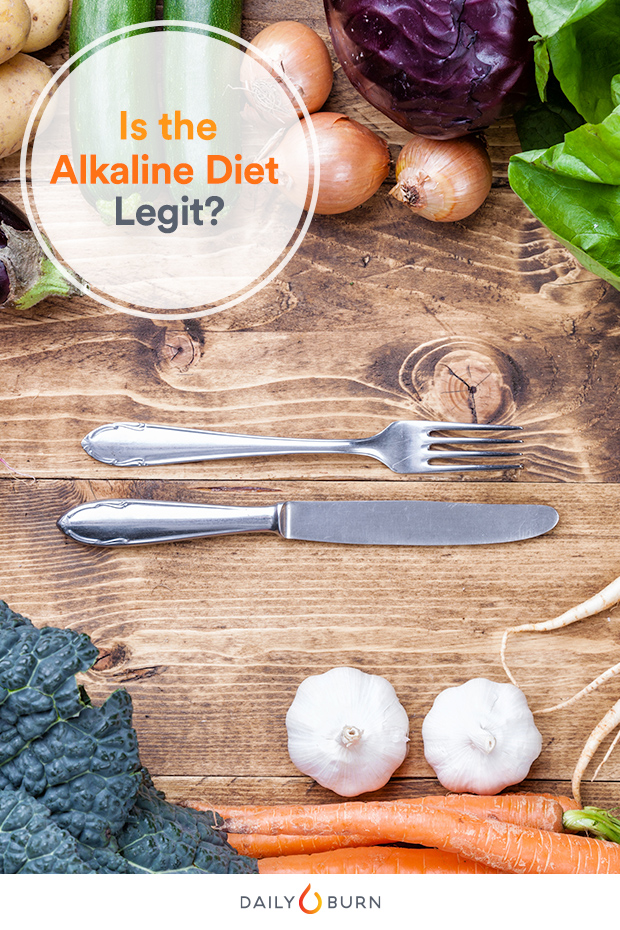
The diet celebrities like Kate Hudson and Kelly Ripa swear by doesn’t rely on calorie counts, juice cleanses or nutrient profiles. Instead, the alkaline diet encourages you to optimize your body’s pH levels.
According to the plan, you should favor alkaline-rich foods like fruit and veggies and steer clear of acid-inducing ones like meat, dairy and grains. By doing so, proponents of the diet claim that you help your body maintain a healthy pH balance, which promotes weight loss, prevents osteoporosis and improves your health.
Sounds simple enough, right? But before you head to the store to buy your own set of pH test strips, you’ll want the full story.
RELATED: The Nordic Diet: The New “It” Diet (Plus 9 Recipes to Try)
What You Need to Know About the Alkaline Diet
If you remember back to high school chemistry class, pH measures whether something is acid or basic (or alkaline). On a scale from one to 14, anything below seven is considered acidic and anything above seven is considered alkaline. That means water typically registers as a seven, while lemon juice falls in the lower end of the spectrum (acidic) and baking soda at the higher end (alkaline).
Our body functions within a very small pH range — between 7.35 to 7.45 — which is slightly alkaline. And we have an internal checks and balances system to keep it that way. “Our body has mechanisms by which it naturally controls our blood pH to ~7.4,” says Vandana Sheth, RD, CDE and spokesperson for the Academy of Nutrition and Dietetics. “Any imbalances are immediately addressed by our kidneys and lungs.”
Why Go Basic?
“The alkaline diet claims to help your body maintain blood pH levels,” says Joy Dubost, PhD, and a registered dietician based in Washington, DC. The theory goes that if you eat acid-forming foods, you create a low pH environment, which stresses out your cells. Thanks to the increased acid load, your body has to work extra hard to bring your pH back to its optimal range. Over time, proponents believe that this can lead to inflammation, chronic disease and lower immunity, not to mention increase your risk for cancer and osteoporosis.
“The pros of this type of diet are that you’re including more vegetables and fruits.”
The diet calls for packing your plate full of alkaline-rich foods, including fruits and vegetables while avoiding acid-producing ones such as eggs, dairy, grain, meat, fish, sugar, alcohol, caffeine and processed foods. By choosing a plate full of veggies over fish and chips, you help your body naturally maintain inner harmony. Less stress means a healthy and happy body, right? It’s more complicated than that.
RELATED: How Much Caffeine Are You Really Drinking?
It’s Not All About the Base
“[The alkaline diet] presumes that what a person eats influences how the body responds and can dictate a change in pH,” says Dubost. But that’s not true.
“Any food that we eat cannot make a significant change in our blood pH,” says Sheth. According to Dubost, you’d have to eat a lot of acid-producing foods to have any affect on the body. “You’d also have to eat these foods on a regular basis, not just one meal, to say it’s changing your blood pH,” she says.
And that pH test strip which you use to test the pH of your pee? It might not be all it’s cracked up to be. “Any urine test pH will show the effect of food we ate, but it will not be a reflection of the pH of our blood or cells,” says Sheth.
Is It Worth Eating Only Alkalinizing Foods?
Yes and no.
Eating more alkaline-producing foods doesn’t hurt. “The pros of this type of diet are that you’re including more vegetables and fruits and it recommends avoiding carbonated beverages, minimizing the intake of refined grains and sugars,” says Sheth. “Some of the benefits, such as weight loss experienced by those following this type of diet, may be due to the avoidance of many high-calorie food choices.”
But if you stick with only alkalinizing foods, you may be unnecessarily avoiding key nutrients like calcium, potassium and vitamin D. “When you start eliminating the best sources of these nutrients, like dairy, you could set yourself up for having real deficiencies and lack of nutrients down the road.” says Dubost. And reducing your protein intake may not help your weight loss goals in the long run. “Protein helps with weight maintenance, weight loss and the prevention of muscle loss,” says Dubost.
RELATED: My Diet Is Better Than Yours: The Superfood Swap Diet
Plus, the research on the health effects of the alkaline diet is spotty and mixed. There’s some research that shows that a high acid diet may be associated with an increased risk for type 2 diabetes and for kidney stones while other researchers have found that an alkaline diet doesn’t prevent calcium loss in bones or that a low urine pH does not predict osteoporosis risk.
According to Dubost, the research on alkaline diets reducing the risk of chronic disease doesn’t give a definitive reason alkaline-rich foods may have an impact. “It could be due to other factors [aside from the alkaline diet] like lowering calorie intake, eating foods higher in nutrients and antioxidants,” she says. “The bottom line is there’s really no research or evidence that I’m aware of to support the recommendation of such a diet.”
“The key is to enjoy a wide variety of fruits, vegetables, whole grains, lean proteins and heart healthy fats for nutritional balance and health,” says Sheth.
